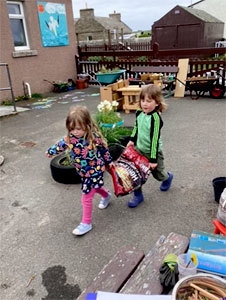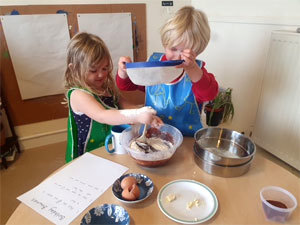Improved quality of interactions with children in Papa Westray nursery class
Papa Westray Community School and nursery class serve the island of Papa Westray, which is one of the most northernly islands of Orkney. At the time of the inspection, there were six children attending the school, ranging from P1-P6 and three children attending the nursery. The school has a changeable school roll due to families moving to the island and staying for varying periods of time.
The reason for improvement
Senior leaders recognised that there was a need to ensure children were motivated to play and learn together day after day through building positive experiences with each other. High-quality interactions with staff and peers also help children to develop strong positive relationships., Children required support to be fully equipped to adapt, advocate and compromise within and out with the school setting. Senior leaders needed to identify ways in which children could be supported to build a strong foundation in relation to respect and flexibility that they can carry with them into their future relationships.
The headteacher, who is also the main class teacher, recognised there was a need to support children to build healthy and resilient relationships, due to the school roll being low. Children may have only few peers, whose interests and developmental needs may differ significantly from their own.
What Papa Westray Community School did
This school’s approach is rooted in an understanding that skills in healthy relationship formation and good decision-making lay the foundation for children’s learning. Staff aim to support children to develop these skills as early as possible. At the school, respect for the child begins with the adult but inevitably forms the basis for children's relationships with each other.
The school ethos begins with staff expressing genuine interest and enthusiasm in the topics of conversation that children initiate. As a result, staff know the children very well. Staff skilfully scaffold small group conversations as they occur naturally throughout the day. They do this by linking the shared moment to the individual experiences and interests of children, supporting them to connect with each other. Staff facilitate the conversations and model positive interactions for children. Through conversation, children begin to see themselves and their peers as interesting. They start bringing ideas into their relationships with others and begin to grow and develop independently of staff support.
Staff develop positive relationships with children through high-quality interactions. Particularly within extended mealtimes, stories and relaxed activities, where staff ensure that there is adequate time given to unstructured conversation and exploration. Staff support children to listen respectfully to other children during play and group time. Children are highly motivated to contribute ideas. Staff value and act upon these, as the norm. If a suggestion has practical difficulties, staff take the time to consider and talk through them with the children. Tools such as voting are regularly used where there is any disagreement.
Highly effective approaches to conflict resolution and problem-solving are a key method that staff use to ensure positive interactions with children across the setting. They view conflict as a valuable opportunity for connection and growth. Children’s perspectives are validated, and when they are ready, staff supports them to find a solution to their problem. The key goal is to ensure that children feel understood, and confident in their ability to solve problems.
What the sustained impact has been
Staff engagement in professional learning and practice sharing has increased their confidence to engage in high quality interactions that are considered and adjusted to match each child’s individual needs. Staff are more skilled in evaluating when a comment or question will extend thinking and when one will interrupt it.
As a result of the school ethos, children have been supported to develop meaningful and nurturing connections with one another and with staff. After watching adults practising empathy, children are now showing the same empathy to each other: for example, “I think you are feeling very sad. I remember I was sad when I had to go inside.”
Children of all ages value each other and look out for each other’s needs. If they hear a bang, they’ll ask, “Are you okay in there?”
Skilled scaffolding of thought has become so central to nursery life that the children have absorbed this style of communication with each other. Children support each other to make decisions: for example, “I think that will fall. I think it will be dangerous.”
Children are more independent during transition periods such as lunchtimes. They are more confident in their ability to advocate for themselves and ask for help when needed.
Children of all ages now show interest in the thoughts and ideas of their peers and staff on topics of shared interest. As a result, children are now increasingly leading their own learning. They are confident to take the space and time they need to explore lines of enquiry together. Staff engaging with children at an appropriate pace, is resulting in high-quality learning experiences for all children.
The school’s approach to conflict resolution and problem solving is now thoroughly embedded. Staff recognise this from the way that children are approaching difficulties they encounter with more confidence. Children use the language of problem-solving with each other more often: for example, “Let’s teamwork it!”
“It feels reassuring and positive to have a set and consistent approach to dealing with conflict. Confidence and consistency amongst staff have improved when dealing with conflict.”
School Administrator
“That was so quick! I have never seen you two do it that quick. One week I solved it and now you two have solved it”.
Staff member observing a disagreement being resolve successfully between peers.
“It is lovely to see the enthusiasm of the Nursery children and the depth of knowledge they gain from the unhurried approach to learning. They are always keen to share their learning with their peers in the Primary setting.”
Head Teacher

“You get that side; I’ll get this side.”

Making brownies together

“We need to work together to help the stranded islanders.” (Evolved from an interest in bridges)
